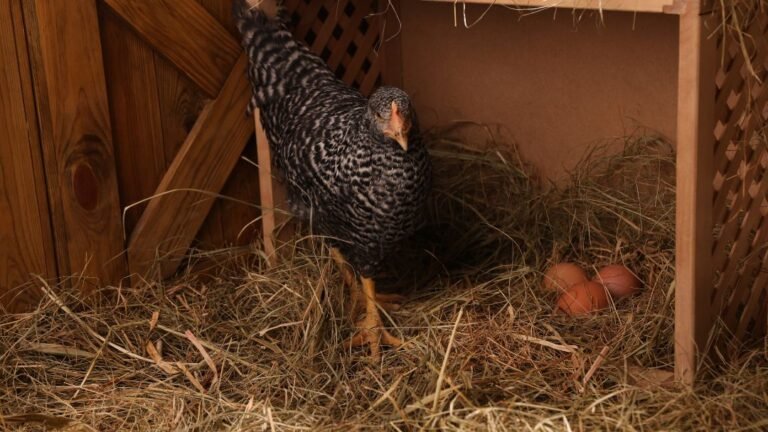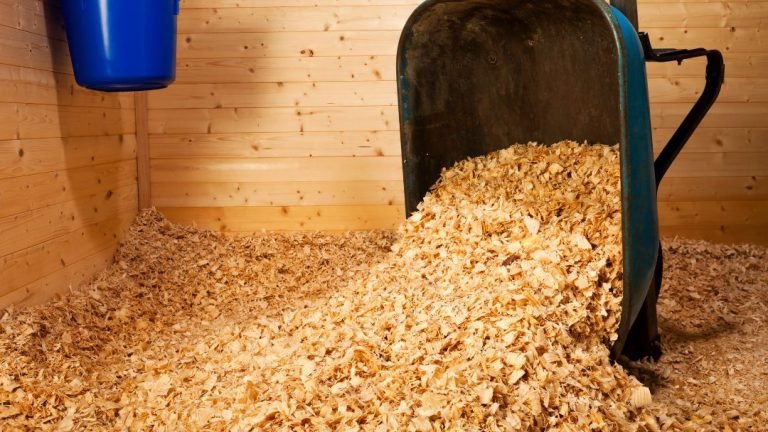Common chicken health problems can be solved with proper care, nutrition, and hygiene practices. This article discusses various health issues that chickens may face and provides practical solutions to address them.
Whether it’s respiratory infections, parasites, or vitamin deficiencies, understanding the symptoms and implementing the necessary measures can ensure the well-being of your feathered friends. By considering preventive measures, providing a balanced diet, maintaining cleanliness, and keeping an eye on their overall health, you can promote the longevity and productivity of your chickens.
Keep reading to learn about the common health problems faced by chickens and the effective solutions to resolve them.
Common Chicken Health Problems: An Overview
Identifying Common Chicken Health Problems
Understanding and recognizing common health problems in chickens is crucial for any poultry owner. By being able to identify these issues early on, you can take prompt action and ensure the well-being and productivity of your feathered friends. Here are some of the most frequently encountered chicken health problems:
- Respiratory Infections: Chicken respiratory issues can manifest in various ways, including coughing, sneezing, nasal discharge, and difficulty in breathing. Common respiratory infections among chickens include infectious bronchitis and sinusitis.
- External Parasites: Mites and lice are common parasites that can infest chickens and cause discomfort and skin irritation. Symptoms may include excessive scratching, feather loss, and the presence of visible parasites on the bird’s body.
- Internal Parasites: Worms, such as roundworms and tapeworms, can wreak havoc on a chicken’s digestive system. Weight loss, decreased egg production, and diarrhea are signs that your chickens may be suffering from internal parasites.
- Coccidiosis: This protozoan infection affects the intestinal tract of chickens and can be life-threatening if left untreated. Symptoms include bloody diarrhea, weight loss, lethargy, and decreased appetite.
- Heat Stress: Chickens are susceptible to overheating, especially in hot climates or during heatwaves. Signs of heat stress include panting, drooling, pale combs, and a decrease in egg production.
- Sour Crop: Sour crop occurs when the crop, the part of the chicken’s digestive system responsible for storing food, becomes impacted or infected. Symptoms may include foul-smelling breath, regurgitation, and a swollen crop.
Understanding The Impact Of Health Issues On Chicken Well-being And Productivity
Health issues can significantly affect both the well-being and productivity of your chickens. When chickens are unwell, their immune system weakens, making them susceptible to further infections. This can lead to decreased egg production, slower growth, and higher mortality rates. Additionally, sick chickens may exhibit stress-related behaviors, such as reduced appetite, decreased activity, and aggression towards other flock members. It’s crucial to address health issues promptly to minimize the negative impact on your chickens’ overall health and productivity.
Maintaining A Healthy Environment For Your Chickens
Maintaining a Healthy Environment for Your ChickensWhen it comes to raising healthy chickens, it is crucial to provide them with a clean and spacious coop, proper ventilation and lighting, and a steady supply of fresh water and nutritious feed. By implementing these practices, you can prevent and address common health problems that can affect your chickens.Providing A Clean And Spacious Coop
A clean and spacious coop is vital for the well-being of your chickens. Dirty and cramped conditions not only lead to stress but also increase the risk of disease outbreaks. Here are some tips to ensure a clean and spacious coop for your flock:- Regularly clean the coop and remove any droppings, feathers, or uneaten food. A clean coop reduces the chances of bacterial and fungal infections.
- Provide ample space for your chickens to move, perch, and roost comfortably. Overcrowding can lead to pecking behaviors and the spread of diseases.
- Spread a layer of clean bedding, such as straw or wood shavings, on the coop floor. This helps absorb moisture and keeps the coop clean and dry.
Implementing Proper Ventilation And Lighting
Good ventilation and lighting in the coop are essential for the overall health and well-being of your chickens. Proper airflow and lighting help maintain optimal temperature, prevent moisture buildup, and minimize the risk of respiratory problems. Here’s how you can achieve proper ventilation and lighting:- Ensure the coop has enough openings or windows to allow fresh air to circulate. This helps remove harmful gases and odors, keeping the air quality high.
- Install vents or fans to improve air circulation, especially during hot and humid seasons. Good airflow helps control humidity levels and prevents the growth of mold and harmful microorganisms.
- Provide sufficient natural or artificial light in the coop. Chickens need a consistent light-dark cycle to stay active and produce eggs regularly. Natural light is ideal, but if not available, install proper lighting fixtures.
Ensuring Access To Fresh Water And Nutritious Feed
Access to fresh water and nutritious feed is crucial for the health and productivity of your chickens. Here’s how you can ensure they receive what they need:- Provide clean water in a suitable container that is accessible to all chickens. Regularly check and refill the water to prevent dehydration and ensure optimal hydration.
- Supply a balanced and nutritious feed that is appropriate for the age and breed of your chickens. Consult a poultry nutritionist or veterinarian for recommendations.
- Regularly inspect and clean the feeders to prevent mold and bacterial contamination. Also, avoid feeding your chickens spoiled or moldy feed.
Preventing And Treating Chicken Diseases
Vaccinations: The Key To Disease Prevention
One of the most crucial aspects of preventing chicken diseases is to ensure that your chickens are properly vaccinated. Vaccinations help in building the chicken’s immune system, protecting them from various common diseases. It is essential to follow a vaccination schedule recommended by poultry experts and veterinarians to keep your flock healthy and disease-free.
Common Chicken Diseases And Their Symptoms
Recognizing the symptoms of common chicken diseases is vital for early detection and prompt treatment. Here are some of the most prevalent chicken diseases and their symptoms:
| Disease | Symptoms |
|---|---|
| Marek’s Disease | Paralysis, weight loss, blindness |
| Infectious Bronchitis | Sneezing, coughing, watery eyes |
| Newcastle Disease | Respiratory distress, nervous system disorders |
Effective Treatment Options For Various Health Conditions
When it comes to treating chicken diseases, there are several effective options available. The choice of treatment depends on the specific disease and its severity. Here are some common treatment options for chicken health conditions:
- Antibiotics: Antibiotics are commonly used to treat bacterial infections in chickens. They help eliminate the underlying infection, allowing the chicken’s immune system to recover.
- Vitamins and Supplements: Providing appropriate vitamins and supplements can help boost the overall health and immunity of your chickens. This can aid in their recovery from various health conditions.
- Isolation and Quarantine: In cases where infectious diseases are diagnosed, isolating the infected chickens and implementing strict quarantine measures can help prevent the spread of the disease to the rest of the flock.
Remember, it is always important to consult a poultry veterinarian for accurate diagnosis and guidance on appropriate treatment options for your chickens. Regular monitoring of your flock’s health and implementing preventive measures can go a long way in ensuring their well-being and productivity.
Nutrition And Supplements For Optimal Chicken Health
The health and well-being of your chickens depend heavily on their nutrition. Feeding a well-balanced diet and providing appropriate supplements is key to ensuring optimal chicken health. In this section, we will explore the importance of nutrition and supplements in keeping your flock healthy and thriving.Feeding A Well-balanced Diet For Overall Health
A well-balanced diet is crucial for the overall health and development of chickens. Just like humans, chickens require a combination of proteins, carbohydrates, fats, vitamins, and minerals to stay healthy. When it comes to their diet, it’s important to provide a variety of foods to meet their nutritional needs.To ensure a nutritious diet for your chickens, consider the following guidelines:1. Include a high-quality commercial chicken feed that is specifically formulated for their age and purpose. This feed will provide the essential nutrients needed for growth and productivity. Look for feeds that are labeled “complete” or “balanced” to ensure that all necessary nutrients are included.2. Supplement their feed with fresh fruits and vegetables. These treats not only provide additional vitamins and minerals but also add variety to their diet. Suitable fruits and vegetables for chickens include apples, carrots, leafy greens, and peas. Remember to chop them into small pieces for easy consumption.3. Provide a source of high-quality protein. Chickens require protein for muscle development and egg production. Include protein-rich foods such as mealworms, earthworms, and even cooked eggs. You can also supplement their protein intake with soybeans or fish meal.4. Offer clean and fresh water at all times. Water is essential for digestion, nutrient absorption, and overall hydration. Ensure that the water source is clean and easily accessible for your chickens.Supplementing With Vitamins And Minerals
Sometimes, even a well-balanced diet may lack certain vital vitamins and minerals necessary for optimal chicken health. This is where supplements come in. Adding supplements to your chickens’ diet can help bridge any nutritional gaps and boost their immune system.Consider the following when supplementing your chickens’ diet:1. Vitamin supplements: Vitamins play a crucial role in various bodily functions such as growth, immunity, and bone development. Vitamin supplements, either in water-soluble or powder form, can be added to their feed or water. Look for supplements that contain vitamins A, D, E, and B-complex vitamins.2. Mineral supplements: Minerals are essential for strong bones, eggshell production, and proper muscle function. Provide mineral supplements such as calcium and phosphorus to support their overall health. You can offer these supplements in the form of oyster shells or crushed eggshells.3. Grit supplementation: Chickens do not have teeth, so they rely on grit to grind their food in their gizzard for proper digestion. Offering insoluble grit, such as small stones or commercial poultry grit, will aid in the breakdown of food and enhance nutrient absorption.The Role Of Probiotics In Promoting Gut Health
A healthy gut is vital for chickens as it affects their digestion and immune system. Probiotics are beneficial bacteria that can support gut health by balancing the microbial population in the digestive tract.Consider the following benefits of probiotics for your chickens:1. Improved digestion: Probiotics can help break down food and enhance nutrient absorption, leading to more efficient digestion.2. Enhanced immunity: A significant amount of the immune system lies in the gut. By promoting a healthy microbial environment, probiotics can boost chickens’ immune response and help ward off harmful pathogens.3. Reduced stress: Probiotics can help alleviate the negative effects of stress on the digestive system. This is especially important during times of environmental changes, transportation, or disease outbreaks.To introduce probiotics into your chickens’ diet, you can find specific probiotic supplements designed for poultry. These supplements usually come in a powdered form and can be added to their feed or water. Follow the recommended dosage instructions provided by the manufacturer.In conclusion, proper nutrition and supplementation are crucial for the optimal health and well-being of your chickens. By feeding a well-balanced diet, providing necessary vitamins and minerals, and incorporating probiotics, you can ensure that your flock stays healthy, productive, and happy. Remember to consult with a poultry nutritionist or veterinarian for specific dietary needs and guidance for your chickens.Promoting Good Hygiene Practices
Regular Cleaning And Disinfecting Of The Coop
Promoting good hygiene practices is essential for keeping your chickens healthy and preventing the spread of diseases. One of the key aspects of maintaining good hygiene is ensuring regular cleaning and disinfecting of the coop.
A clean and disinfected coop provides a healthy environment for your chickens to thrive in. Here are some steps you can follow to keep your coop clean:
- Remove any old bedding or litter from the coop and dispose of it properly. This helps reduce the risk of disease transmission.
- Thoroughly clean all the surfaces of the coop, including walls, floors, and perches. Use a mild detergent and hot water to scrub away any dirt or debris.
- Rinse the coop with clean water to remove any remaining soap residue.
- Allow the coop to dry completely before adding fresh bedding or litter. This helps prevent the growth of bacteria and fungi.
- Once the coop is dry, apply a disinfectant to all the surfaces. Choose a disinfectant that is safe for use around chickens and follow the manufacturer’s instructions for dilution and application.
Regular cleaning and disinfecting of the coop not only helps prevent the spread of diseases but also creates a hygienic environment for your chickens to live in.
Proper Waste Management To Prevent Disease Transmission
Another important aspect of promoting good hygiene practices is proper waste management. Waste, such as chicken droppings and uneaten food, can harbor bacteria and parasites that can cause diseases if not managed correctly.
Here are some tips for proper waste management:
- Regularly remove any accumulated waste from the coop, including droppings, feathers, and uneaten food.
- Dispose of the waste in a designated area away from the coop and any water sources.
- Consider composting the waste if it is safe to do so. Properly managed composting can help turn the waste into nutrient-rich fertilizer.
- Keep the feeding area clean and prevent food from being contaminated by droppings. Use elevated feeders or trays to reduce contact with waste.
Proper waste management not only helps prevent disease transmission but also reduces odor and flies, creating a more pleasant environment for both you and your chickens.
Promoting Personal Hygiene When Handling Chickens
In addition to maintaining a clean coop and proper waste management, it is crucial to practice good personal hygiene when handling chickens. This helps prevent the spread of diseases from chickens to humans and vice versa.
Here are some important personal hygiene practices to follow:
- Wash your hands thoroughly with soap and water before and after handling chickens, collecting eggs, or working in the coop.
- Use gloves when necessary to protect your hands from direct contact with chicken droppings or other waste.
- Clean any tools or equipment used in the coop, such as feeders and waterers, regularly to prevent cross-contamination.
- Avoid bringing chickens inside your home or allowing them to enter areas where food is prepared or consumed.
- Change your clothes and shoes before and after working with chickens to minimize the risk of carrying pathogens.
By promoting good personal hygiene practices, you can minimize the risk of diseases spreading between chickens and humans, ensuring the health and well-being of both.
Conclusion
To ensure the health and well-being of your chickens, it is crucial to be aware of the common health problems they may encounter. By recognizing the signs early on and implementing appropriate solutions, you can prevent any further complications. Regular check-ups, maintaining a clean environment, providing a balanced diet, and practicing good biosecurity measures are key factors in keeping your flock happy and disease-free.
Remember, a healthy chicken is a happy chicken!



